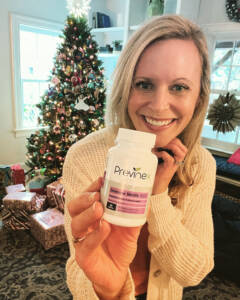More and more people are taking dietary supplements these days. In fact, more than half in the U.S. take at least one. But studies show that most supplements are ineffective and a waste of money. So how can you tell if a supplement is good quality?
It’s tricky. The supplement space is the wild west and very predatory. Anyone can make a supplement and claim its effectiveness. Unless someone challenges these claims, they can keep on selling and deceiving.
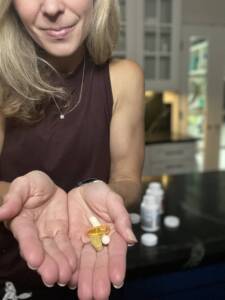
Indeed, I am approached several times a week by supplement brands who want to partner with me. Some of these supplement brands look so legitimate that you have to be a very savvy consumer to look beyond the slick marketing to what’s really in the product.
The Tricky Supplement Industry
For example, I had an iron supplement company reach out to me about their supplement. They had claims from fellow runners talking about how this particular supplement raised their iron levels and improved their performance. I am chronically low in ferritin, so I was intrigued.
Related: Dangers of Low Iron in Female Runners
I sent the information to the founder and CEO of the supplement company Previnex, David Block. A quick scan of the ingredients by his trained eye showed that the iron supplement had complementary nutrients that were too low of ingredients to be effective and used cheap forms of the various vitamins that would not be absorbed by my body. Block said, “this supplement is basically a subpar multivitamin.”
I would have never known.
Block shared with how to train our eyes to be like his in examining supplements for quality. His insights are below.
In this article, I will cover:
- What is a dietary supplement
- Are supplements regulated
- What are trustworthy supplements
- A guide to how to tell if a supplement is good quality
Before I begin, I want to share that I take Previnex supplements. Previnex checks all the boxes below as a trusted supplement company. They use clinically-backed ingredients and blends. Previnex has rigorous regulation testing standards, sources the best highest quality, most clinically effective ingredients, and uses pharmaceutical
manufacturering practicess to make their supplements.You can save 15 percent off their supplements with code TMR15, and get your money back if you aren’t happy or notice a difference.
Okay, now let’s go.
What is a dietary supplement?
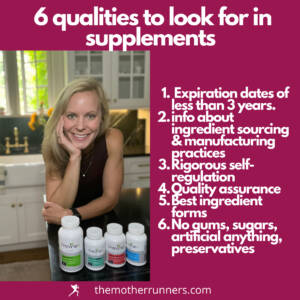
According to the FDA “is a product intended for ingestion that, among other requirements, contains a ‘dietary ingredient’ intended to supplement the diet.”
Under FDA regulations, supplement companies are supposed to regulate themselves. If there are suspicions that their products are misbranded or adulterated—then the FDA has the authority to take action.
This means that although the FDA is in charge of regulating supplements, they do not review the products before they go to market. As Block says, anyone could scoop up sand, put it in a capsule, and market it as a dietary supplement without ever having to register or prove its effectiveness.
This makes the supplement industry problematic, opening opportunities for predatory practices. Indeed, many supplements are ineffective wasting people’s money or harmful—having hurtful health effects on thousands in the U.S. every year.
Related: How I Stopped Being an Injury Prone Runner
Why do we need supplements?
We need supplements to supplement the nutrition in our food because food isn’t as nutrient-dense as it once was due to mass market production. Block explains:
“Nutrients come from the soil. As mass food production kicked into high gear, nutrients continue to be depleted from the soil via degradation, etc. Whereas 40-50 years ago, fruits and vegetables went straight from the farm to the grocery store, it can now take 1-2 weeks for fruits and vegetables to make it to the grocery store, which is problematic for two reasons.
First, many fruits and vegetables don’t finish ripening in the soil, but in transit to the store. This causes nutrient depletion. Second, the time lapse between farm to store also causes nutrients to deplete.”
What is the most trustworthy vitamin company?
Below are the top trustworthy vitamin companies:
- Previnex
- Life Extension
- Douglass Labs
- Thorne
Related: The Top 12 Supplements for Runners
Are vitamins from a drug store good quality?
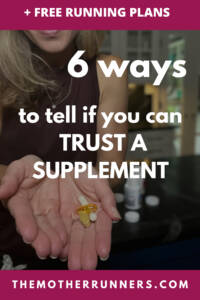
Vitamin D and Calcium can be bought from a drug store like Walgreens or CVS as there isn’t a big distinction between low and high quality forms, says Block.
But other letter vitamins or combination supplements (multivitamins, probiotics, etc.) that come in various forms or are part of blends are best purchased from reputable supplement and vitamin companies.
What are the top dietary supplements sold?
The top supplements sold in the US are multivitamins, vitamin D, calcium, vitamin C and omega-3s. These are associated with health benefits, with multivitamins being used for general health, vitamin D for mood support and bone health, calcium for bone health, and omega-3s for heart and brain health.
What should you look for on a supplement label to ensure quality?
Below are the 6 areas to look at before taking a nutritional supplement. These items can be found on the label and on the dietary supplement brand’s website.
Hear more about how to be a savvy consumer in my interview with Block on The Passionate Runner podcast.
6 Ways to Tell if a Supplement is Good Quality
-
Expiration date.
The expiration date on your supplement or vitamin bottle should be two to three years out at most. If it is longer than that, there is a good chance the supplement brand bulked added much higher levels of key nutrients at the front end to account for up key ingredients to account for degradation when on store shelves. This can be dangerous.
More supplement companies may be doing this to account for pandemic-related supply chain shortages.
The problems with this are a) you may be getting too much of a certain ingredient and b) the efficacy will degrade overtime.
Related: Can Taking Collagen Prevent Injuries?
-
Active Ingredients.
The active ingredients on a supplement bottle should be in the highest quality forms available. How can you tell? If a company is committed to using the highest quality ingredients, you can bet that several have been run through clinically studies (which you can tell if a registered trademark is next to them (a little R with a circle or TM). This indicates that they have been clinically studied, explains Block.
To take a step further, head to Google Scholar and search for studies related to the ingredient. You want an ingredient that’s been studied and published in a peer-reviewed journal in human clinical studies.
Also, do a google search for the best quality form of the active—or most important—ingredient. There are many different versions of a vitamin or mineral. Some are cheap, low quality, hard on the stomach, and have low bioavailability (your body can’t access it well).
Supplement brands will use these versions because they are cheaper and know the consumer doesn’t know the difference.
The more expensive forms of vitamins and minerals will be better utilized by your body and thus more effective.
Looking at just one supplement ingredient will give you a good sense of whether the entire formulation is high-quality.
For example, if you’re looking at collagen that’s coupled with Vitamin C to promote absorption—if that vitamin C is the lower quality synthetic version (ascorbic acid) rather than the higher quality mineral ascorbate, then you know the rest of the ingredients are probably not a high quality either.
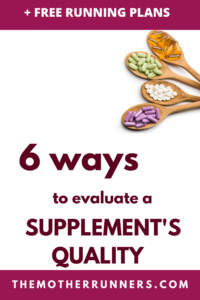
Related: 9 Reasons Why You Aren’t Getting Faster
-
Other ingredients.
Look at the other ingredients as a clue to whether it’s a high-quality supplement. Don’t use it if your supplement includes gums, sugar alcohols, genetically modified ingredients, artificial anything, or preservatives.
This includes gummy vitamins.
Block says, you can make supplements without these ingredients. Adding these ingredients like sugar alcohols, for example, which technically lower the grams of sugar on the supplement label, can trigger a glycemic response which can contribute to long-term detrimental health impacts.
-
Amount of key ingredients.
Look at the number of key ingredients on your supplement bottle. A supplement brand may use a high-quality vitamin form but they may cut costs by not using enough to be effective.
You can do your own research on Google to see what the effective dose is and then compare that with what’s on your bottle.
You want to steer clear of a supplement ingredient that’s too much or too little.
-
The seller.
Typically you can buy supplements from four sources:
- a mass market channel like CVS, Costco, or Walgreens, for example;
- natural health food channels like Whole Foods or online;
- the practitioner channel, through health care professionals’ offices; and
- Amazon.
While buying from a health foods store or a doctor’s office increases your chances of buying a quality supplement, it’s not a given, says Block. It’s best to do your own research.
Related: How to Get Faster as a Master’s Runner
Should I buy supplements from Amazon?
When buying off Amazon, aim to buy the supplement directly from the seller. Avoid buying supplements that are “Amazon fulfilled”—these are mostly Amazon Prime purchases.
This is especially important in the summer because these supplements are stored in Amazon warehouses, at temperatures that can reach 140 degrees Fahrenheit. These conditions can degrade the supplement’s efficacy and quality!
Related: 9 Steps to Return to Running After Injury
-
The website.

I trust Previnex supplements because the company is transparent and I have noticed positive effects since taking them.
When looking at a supplement company’s website, ask yourself “is this a branding company that sells supplements or is it a nutritional science company?” You want it to be the latter.
Characteristics you want to look for on the vitamin brand or supplement brand’s website are:
-
Reputable research.
Ideally, you want to see links to randomized, multi-center, third-party double-blinded, placebo controlled human clinical studies published in peer-reviewed journals that have scrutinized the research in advance of publication. Don’t be fooled by “third-party research” done in a person’s garage.
-
Ingredient source information.
Avoid ingredient sourcing in China. Ingredients sourced in North America or parts of Europe are the U.S. in rich soil are going to be more effective and have less contaminants. This is particularly true of protein. While it may be hard to ascertain where an ingredient is sourced, ask your supplement brand to send a Certificate of Analysis on an ingredient or finished products.
-
The lifetime of the company.
Look for companies that have been around for more than five years.
-
Manufacturing and transparency.
Reputable nutritional supplement brands will share information about their manufacturing policies. Supplement brands like Previnex use pharmaceutical manufacturing facilities, clinically studied ingredients, and will share their Certificate of Analysis on ingredients and
products.
-
Self-regulation.
High-quality supplement companies will have rigorous self-regulation to ensure they are making the highest quality supplements. Self-regulation qualities include ingredient testing, production run testing, and finished product testing. Ask a supplement company to provide one or all of these and you can find out quickly if the company conducts these important tests. (Here is any example of a Certificate of Analysis from Previnex on their Omega Pure PLUS product.)
-
Quality assurance.
Trusted supplement brands have products that are designed to create health and tangible benefits. Because of this, they will offer quality and peace of mind assurances such as a moneyback guarantee.
Do supplements need to be certified?
No, supplements do not need to be certified by a third party to be reputable. According to Block, third-party testing like those done by the NSF are costly and basic. This means that the costs of the tests are then handed off to the consumer. And the tests aren’t extensive enough to ensure quality.
“It’s really expensive (tens of thousands of dollars per year) to get certified and has to be renewed annually with each production run (which could be 3-4 times per product, per year),” explains Block. “Many supplement brands make the business decision to not spend their money on this process so they don’t overburden the consumer with what would have to be a higher priced product.”
To understand the actual certification process and whether this has any bearing on whether a product is “high quality,” here are the tests that are performed by NSF to certify a nutritional supplement.
Second, the tests basic microbiological tests (yeast, mold, fungi, etc.). Reputable supplement companies like Previnex will do more extensive testing than those required for certification.
If you want guidance with your running, check out my run coaching services. Also, be sure to check out my free training plans:
- Postpartum Training Plan
- After a Break Training Plan
- 5k Training Plans
- 10k Training Plans
- Half Marathon Training Plans
- Marathon Training Plans
- Strength Training Plan

